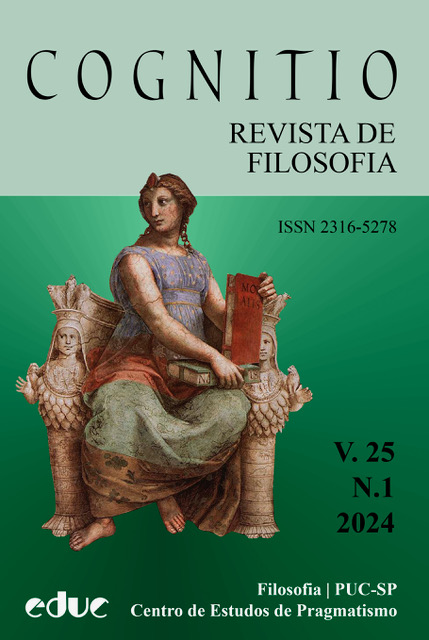Revisitando o pragmatismo político e a educação
Rawls, Dewey, Bernstein
DOI:
https://doi.org/10.23925/2316-5278.2024v25i1:e64973Palavras-chave:
teoria crítica, liberalismo, filosofia política, pragmatismo, socialismoResumo
Ao colocar John Dewey entre John Rawls e Richard Bernstein, defendo uma leitura socialista das posições de Dewey sobre a democracia liberal que se afasta tanto das leituras conservadoras de Dewey como daqueles que afirmam que o seu liberalismo democrático na verdade pertence a uma visão de direita ou de centro, e de comunitaristas de esquerda que rejeitam tais pontos de vista como irrelevantes para as variantes socialistas e radicais da democracia liberal. De uma maneira geral, pode-se demonstrar que as diferentes opiniões de Rawls e Dewey sobre o liberalismo político poderiam ser, em última análise, reconciliadas, dadas as suas posições semelhantes sobre a democracia, o pluralismo e a pessoa humana. Pode-se ainda demonstrar que a própria reabilitação de Kant por Rawls está intimamente relacionada à sua leitura de Dewey. Além disso, como argumenta Bernstein, tal renovação da filosofia social e política de Dewey no construtivismo político e no equilíbrio reflexivo de Rawls foi decisiva para a grande guinada pragmatista observada na segunda, terceira e quarta gerações da teoria crítica, não apenas na chamada Escola de Frankfurt (especialmente Habermas, Honneth, Forst), mas também em pensadoras feministas e decoloniais como Nancy Fraser, Seyla Benhabib, Judith Butler, Rahel Jaeggi e Amy Allen. A reviravolta pragmática de Dewey na filosofia política permite, assim, uma correlação dinâmica e robusta entre a democracia radical e a educação pública, que poderia ser implementada em democracias emergentes como o Brasil.Referências
ANDERSON, Elizabeth. What is the Point of Equality? Ethics, v. 109, p. 287-337, 1999. https://doi.org/10.1086/233897
BENHABIB, Seyla. The Generalized and the Concrete Other: The Kohlberg-Gilligan Controversy and Feminist Theory. In: BENHABIB, Seyla; CORNELL, Drucilla (eds.). Feminism as Critique: On the Politics of Gender. Minneapolis, MN: University of Minnesota Press, 1987.
BERNSTEIN, Richard J. John Dewey. New York: Washington Square Press, 1966.
BERNSTEIN, Richard J. Praxis and Action: Contemporary Philosophies of Human Activity. Philadelphia: University of Pennsylvania Press, 1971.
BERNSTEIN, Richard J. The Pragmatic Turn. New York: Polity Press, 2010.
CAMPBELL, James. Understanding John Dewey: Nature and Cooperative Intelligence. Chicago: Open Court, 1996.
CASTILLO, Ramón del; FAERNA, Ángel; HICKMAN, Larry (eds.). Confines of Democracy: Essays on the Philosophy of Richard J. Bernstein. Leiden: Brill, 2015.
CELIK, Rasit. Rawls and Dewey on Democracy, Pluralism, and the Person. Etica & Politica/Ethics & Politics, v. XXI, n. 2, p. 209-224, 2019.
COHEN, G.A. Rescuing Justice and Equality. Cambridge: Harvard University Press, 2008.
DEWEY, John. Construction and Criticism. New York: Columbia University Press, 1930.
DEWEY, John. John Dewey: The Early Works, 1882-1898, Carbondale: Southern Illinois University Press, 1971.
DEWEY, John. Democracy and Education. Carbondale and Evansville. Southern Illinois University Press, 1985.
DEWEY, John. Human Nature and Conduct: An Introduction to Social Psychology. New York: Cosimo Classics, 2007.
DEWEY, John. Reconstruction in Philosophy. New York: New American Library, 1950.
DEWEY, John. The Need for a Recovery of Philosophy. Creative Intelligence: Essays in the Pragmatic Attitud. reprinted in John Dewey: On Experience, Nature and Freedom, ed. by Richard J. Bernstein. New York: The Liberal Arts Press, 1960.
DILWORTH, David A. Santayana’s Review of Dewey’s Experience and Nature: Pivotal Expression of a Philosophy of Living Nature and Vivacious Spirit. Bulletin of the Santayana Society, v. 21, p. 15-30, 2003. https://doi.org/10.5840/200321215
FRASER, Nancy. Pragmatism, Feminism, and the Linguistic Turn. In: BENHABIB, Seyla; BUTLER, Judith; CORNELL, Drucilla; FRASER, Nancy (eds.). Feminist Contentions: A Philosophical Exchange. New York: Routledge, 1995.
GREEN, Judith M. (ed.). Richard J. Bernstein and the Pragmatist Turn in Contemporary Philosophy: Rekindling Pragmatism’s Fire. New York: Palgrave Macmillan, 2014.
HABERMAS, Jürgen. Legitimation Crisis. Trad. T. McCarthy. Boston: Beacon Press, 1975.
HABERMAS, Jürgen. Zur Rekonstruktion des historischen Materialismus. Frankfurt: Suhrkamp. In English: Communication and the Evolution of Society. Boston: Beacon, 1979.
KANT, Immanuel. Über Pädagogik. In: WEISCHEDEL, Wilhelm (ed.). Schriften zur Anthropologie, Geschichts-philosophie, Politik und Pädagogik. v. 2. Frankfurt: Suhrkamp, 1977.
PARFIT, Derek. Equality or Priority. In: CLAYTON, M; WILLIAMS, A (eds.). The Ideal of Equality. Basingstoke: Palgrave McMillan, 2002.
RAWLS, John. A Theory of Justice. Cambridge, Mass.: Harvard University Press, 1971.
RAWLS, John. Collected Papers. FREEMAN, Samuel (ed). Harvard University Press, 1999.
ROGERS, Melvin L. Dewey, Pluralism, and Democracy: A Response to Robert Talisse. Transactions of the Charles S. Peirce Society, v. 45, n. 1, p. 75-79, 2009. https://doi.org/10.2979/tra.2009.45.1.75
RORTY, Richard. Consequences of Pragmatism: Essays 1972-1980. Minneapolis: University of Minnesota Press, 1982.
RUSSELL, Stuart J.; NORVIG, Peter. Artificial Intelligence: A Modern Approach. 4. ed. London: Pearson, 2022.
ULLMANN, Reinholdo. A universidade medieval. Porto Alegre: Edipucrs, 2000.
Downloads
Publicado
Como Citar
Edição
Seção
Licença
Copyright (c) 2024 http://creativecommons.org/licenses/by/4.0/

Este trabalho está licenciado sob uma licença Creative Commons Attribution 4.0 International License.









